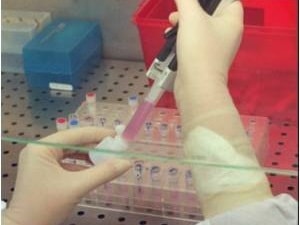Discovery of the gene code that causes esophageal cancer
A group of American scientists said on March 24 that they had discovered variations in 26 genes that can cause esophageal cancer, one of the deadly diseases that is increasingly common in the world, and hope that this will be the "key" to help scientists find a new drug to treat this dangerous disease.
The results were published after scientists decoded the genes of esophageal cancer cells from 149 patients and compared them with cells from healthy people, to identify genetic variants that can cause esophageal adenocarcinoma (EAC).

Illustration photo. (Source: medindia.net)
Genes are segments of DNA that carry instructions for cells to function. Meanwhile, the team found a frequent recurrence of a particular type of gene mutation in people with esophageal cancer, most likely caused by acid reflux disease (ERD).
Scientists believe it is chronic acid reflux that causes this particular form of DNA damage that leads to esophageal cancer.
EAC often stems from a condition called Barrett's esophagus, which is a condition in which the lining of the esophagus is replaced by tissue that corresponds to the lining of the intestine, often caused by chronic acid reflux.
According to research, the incidence of this disease has increased by 600% in the past 30 years, especially in Western countries. Each year, esophageal cancer has claimed the lives of about 15,000 Americans and 400,000 people worldwide. According to the investigation, the survival rate of patients with this type of esophageal cancer (cancer of the muscular tube connecting the mouth to the stomach) after 5 years of the disease is only about 15-20%.
Cancer develops when the DNA of cells in the human body mutates, causing the normal function of the cells to be disrupted and then grow out of control. There are many different causes of the disease, including obesity, smoking, exposure to ultraviolet rays from the sun and environmental pollution.
Different gene mutations cause different cancers, but there are also big differences even among people with the same form of the disease. Therefore, discovering new variants will be the most specific clue, helping to find a specific drug for this disease./.
According to (TTXVN) - VT






